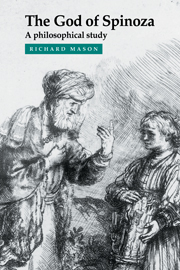7 - History
Published online by Cambridge University Press: 06 January 2010
Summary
Spinoza's God cannot stand outside history, directing or intervening at will. What was said in Part I of this study applies to God's causal relationship with history as much as it does to individual people or objects. Equally, from Chapter 4, it should be clear that the course of history cannot be seen as containing any directed purpose or plan. So the explanation for events should never be sought in terms of divine intentions or aims.
This suggests that any discussion of Spinoza's thinking on the place of God in history ought to be short and conclusive. Divine providence is not mentioned in the Ethics. In the Theological-Political Treatise what ‘the common people suppose’ by ‘God's power and providence’ is dismissed. Rather, God's existence and providence are far better ‘inferred from Nature's fixed and immutable order’.
So what is left to be said about religion in history? In particular, what is to be said about Spinoza's own native religion? The history of the Jewish people has been held to reflect or embody its election by God – Blessed are You, Lord our God, king of the universe, who has chosen us from all the peoples and who has given us his Torah. David Novak, writing on the Election of Israel, has described this declaration as ‘an elementary Jewish proposition in the legal sense … irreducible to any other theological proposition’.
- Type
- Chapter
- Information
- The God of SpinozaA Philosophical Study, pp. 172 - 184Publisher: Cambridge University PressPrint publication year: 1997



